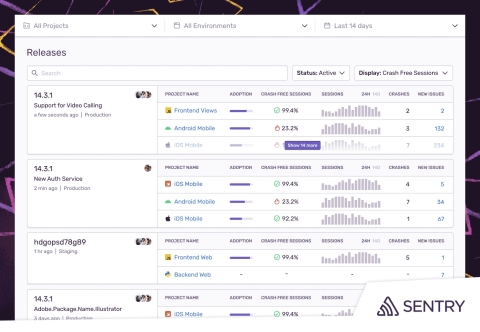Sentry Delivers Full Suite of Application Monitoring Capabilities to JavaScript Developers
Sentry Delivers Full Suite of Application Monitoring Capabilities to JavaScript Developers
Sentry’s capabilities empower developers to quickly and efficiently identify errors, resolve performance bottlenecks, and ensure flawless customer experiences.
SAN FRANCISCO--(BUSINESS WIRE)--Sentry, the market leader in application monitoring, today announced the latest release of its JavaScript SDK, which adds Sentry’s Release Health capabilities to its best-in-class error and performance monitoring offering. Software teams can gather specific, actionable insights to resolve the most impactful errors, quickly investigate slowdowns, and effortlessly track the success of releases over time, all with just eight lines of code.
Frontend development continues to skyrocket both in popularity and business significance. The prevalence of JavaScript as a language is staggering, with nearly 70% of developers reporting they use JavaScript in their roles to create rich, device-centric experiences for users across many different platforms. As the world’s reliance on digital products and services grows, maintaining flawless user experiences becomes a business-critical effort. With Release Health now configured by default, teams can track the stability and version adoption of an application in real time. Developers can immediately surface issues in the latest release and pinpoint exactly where a release begins to degrade with insights about version adoption and session data. This enables teams to remediate issues that have the most impact on users, analyze how releases perform over time, and free up developers to work on value-adding projects.
“Code is increasingly becoming the center of every customer experience, and when it fails, business fails,” said Milin Desai, CEO, Sentry. “With Sentry for JavaScript, application monitoring is more than just a failsafe for frontend development — extending Release Health capabilities to JavaScript projects is key to helping developers understand how each release is performing and what’s required to deploy more frequently.”
Sentry for JavaScript links error monitoring and performance monitoring along with Release Health insights, providing product owners with a complete picture of application health across every possible platform for their products. When end users experience errors, delays, or downtime, product teams no longer need a host of disparate tools to investigate and resolve problems. Sentry’s capabilities empower developers to quickly and efficiently determine who is impacted, and to what extent, and whether or not the problem is a bug or simply inefficient code.
Sentry Keeps Eventbrite Focused on Growth, Not Performance Issues
Eventbrite, a global event management and digital ticketing company, was already preparing to move to a continuous deployment model when the pandemic brought a massive shift from in-person to virtual events. The shift meant the team needed to quickly adapt to increasing demand, scale its services, and ideally continue with its transition to CI/CD. Jaylum Chen, staff software engineer at Eventbrite, and his team needed an application monitoring solution that could help them discover and triage errors across multiple platforms in real-time, while also minimizing alert noise and giving them visibility into the health of every release.
“With just a few lines of code, I was able to immediately capture events across our Python, JavaScript, and React Projects,” said Chen. “Sentry helps our team fix the most important issues in each release. We can track how a release is trending by percent of crash-free sessions. With this data, we can remediate issues that impact the most users and move on to building more features.”
By taking the mystery out of debugging and revealing trends in application health, Sentry ensures Chen and his team can focus their time on building new features to support their skyrocketing demand.
Effective Cross-Platform Application Monitoring with Sentry
Organizations worldwide rely on Sentry application monitoring to provide unprecedented context and insight, reducing time to remediation and keeping code performing flawlessly. The addition of Sentry Performance Monitoring enables engineering and development teams to more quickly identify performance issues by tracing them to poor-performing API calls along with related errors. Sentry can also help them surface trends to proactively prevent future performance issues, saving time and dramatically reducing costs.
With Release Health now configured by default, teams can track how a product release is trending from the very second it’s live to the point it starts to erode. This allows them to more quickly detect bad releases by gauging the levels of adoption and the percentage of crash-free sessions and crash-free users, accelerating continuous deployment efforts.
Armed with rich insights, product teams can prevent costly downtime and meet high customer expectations while maximizing efficiency and improving their workflows so that more time can be spent creating new services and applications that add business value.
Learn more about Sentry for JavaScript on the company blog, and check out the documentation.
About Sentry
Sentry’s mission is to eliminate the havoc and potential financial loss associated with defective software by making best-in-class application monitoring available to all software teams. Sentry helps developers discover, triage, and prioritize code errors and performance bottlenecks in real time in order to deliver the best possible end-user experiences complementing your systems monitoring tools. More than 60,000 organizations worldwide — and many of the world’s best software companies — including Atlassian, Cloudflare, Disney, GitHub, and Microsoft, use Sentry to diagnose, fix, and optimize the performance of their code. Learn more at https://sentry.io.
Contacts
Jennifer Tanner
Look Left Marketing
sentry@lookleftmarketing.com
(229) 834-3004

